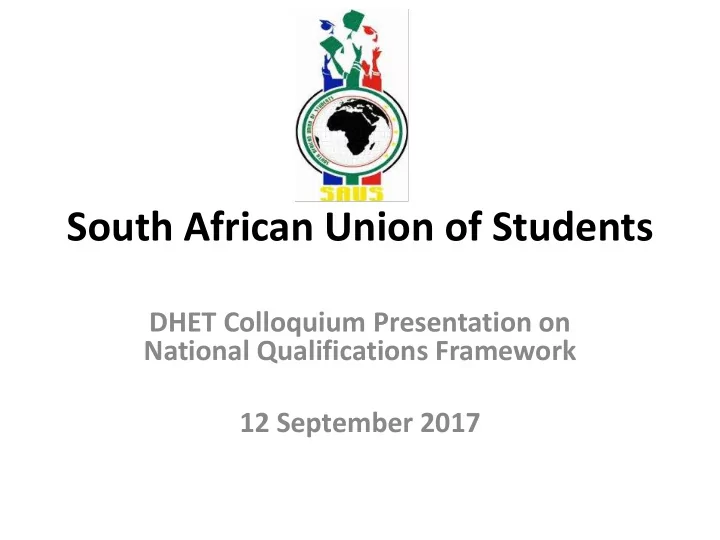

South African Union of Students DHET Colloquium Presentation on National Qualifications Framework 12 September 2017
Introduction • The South African union of students is pleased to receive an invitation to participate as part of respondents at the department of higher education and training organised annual research colloquium taking place from the 12 and 13 September 2017 in Gauteng Province. • We are informed that the colloquium is hosted under the theme “Enhancing the Implementation of the South African National Qualifications Framework (NQF)” .
Background • The NQF was introduced in 2008 as NQF Act 67 of 2008. • The Objectives of NQF are to create a single integrated national qualification framework, facilitate access, mobility and progression; enhance the quality of education, Accelerate the redress of past unfair discrimination in education, training and employment opportunities, to contribute to the full personal development of each learner and the social and economic development of the nation at large.
Success stories on the National Qualification Framework. • Increase in the enrolment quotas in most institutions of higher learning. • The growth of the T-VET sector over the years is very much remarkable. • The visible increase of black students and black academics in our institutions. • Successful registration of national qualifications, public credibility and quality assurance are notable signals of positive impact of NQF over the past 8 years.
Barriers to Implementation of NQF. • Attitude of some academic staff towards students and Lack of qualified lecturers. • Commodification of education and Victimization of students. • Unemployed graduates and Continuous protests affecting learning time. • The increase of bogus colleges and The crisis of drop-out rates • Lack of infrastructure and Public perception of the education system. • Lack of political will amongst stakeholders in the higher education.
Recommendations and way forward • Develop strict measures as consequences of not adhering to the NSF Act. • Introduce monitoring and evaluation unit as part of the framework. • Curriculum content transformation. • The NSF act must be amended to address the issue of articulation. • Re-alignment of qualifications. • Decentralisation of decision making. • The NSF Act must clarify the role of private sector or industry.
Recommendations and way forward • Effective communication strategies to improve awareness. • The NGAP program to complement the work of NQF.
Conclusion We appreciate that most of the recommendations of the evaluation study make a lot sense and they are giving direction, however we need to be specific in making these recommendations measurable and with clear time frames e.g. you mention on recommendation 25 that NQF bodies needs more funding to execute their mandates we need to mention figures here as to how much is needed. Again you say in your recommendation number 9 that NQF forum must sit regularly we need to be specific for example after every three months.
End Thank you
Recommend
More recommend